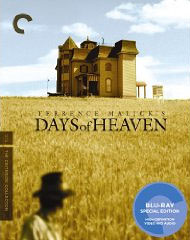Blu-ray Review: Days of Heaven
 No one would argue that director,
writer and producer Terrence Malick is a prolific filmmaker. Since
directing his first feature, Badlands, in 1973, he has
directed a mere three more. Four, if you count the upcoming The
Tree of Life, which has been in production for two years. Malick is not one to be
rushed. But what Malick's career lacks in quantity, it more than
makes up for in quality. His first two films, Badlands and
Days of Heaven, are considered classics; his third, The
Thin Red Line, was a critical darling when released in 1998.
No one would argue that director,
writer and producer Terrence Malick is a prolific filmmaker. Since
directing his first feature, Badlands, in 1973, he has
directed a mere three more. Four, if you count the upcoming The
Tree of Life, which has been in production for two years. Malick is not one to be
rushed. But what Malick's career lacks in quantity, it more than
makes up for in quality. His first two films, Badlands and
Days of Heaven, are considered classics; his third, The
Thin Red Line, was a critical darling when released in 1998.
Given Malick's auteur reputation, it's no surprise that Days of Heaven has achieved an honor bestowed on a relative handful of films: It's now available on a stunning new Criterion Collection Blu-ray Disc, starting today. Released to wide acclaim in 1978, Malick's second feature is a fine example of his visually poetic, deliberately paced style.
Set in the Texas Panhandle at the dawn of World War I, Days of Heaven is the story of Bill (Richard Gere), a Chicago steelworker who, after killing his boss in a fight, flees to Texas with his girlfriend, Abby (Brooke Adams), and young sister Linda (Linda Manz). The three find work harvesting wheat in the fields of a stoic Panhandle farmer known only as The Farmer (Sam Shepard).
When the harvest ends, the farmer -- in love with Abby but unaware that she and Bill are a couple (they have been posing as brother and sister) -- invites them all to stay on at the farm. In quintessential Malick fashion, the story then becomes a study -- a thoroughly poetic one, of course -- of human nature's dark side. The love triangle turns from merely complicated to completely sinister, as Abby marries the farmer in a cynical scheme to inherit his assets. The scheme goes awry, and the characters' underlying tensions explode against a biblically disastrous backdrop of locusts, fire and death.
To lend a certain emotional distance to the film, Malick's screenplay uses an unusual device: Linda narrates the story, in words that are as much commentary as storytelling. Her flat tone (in a memorable performance by Manz) often softens the intensity of otherwise very emotional scenes, as if she's either unaware of the scenes' emotional significance (as a child might be) or just beaten down by the harshness of farm life and tragic turn of events. Either way, the understated tone is an interesting contrast to the brilliant visuals by cinematographer Néstor Almendros, who won an Oscar for his naturalistic details and sweeping Panhandle vistas. (Famed cinematographer Haskell Wexler also shot much of the film, and apparently was rankled when given only a minor "additional photographer" credit.)
The Criterion Collection handles Days of Heaven with the expected care. Blu-ray technology is meant for this kind of film, doing justice to every detail of Almendros and Wexler's iconic camerawork. (Malick, editor Billy Weber and camera operator John Bailey supervised and approved the digital transfer, and their stamp of approval is evident in every glorious shot.) This disk is a must-see for any Malick fan or student of Texas film history.
Extras: The disk includes many extras, including a commentary track by Weber and the film's art director, costume designer, and casting director; an audio interview with Gere; and video interviews with Bailey, Wexler, and Shepard. An added bonus is a slick 40-page booklet with many color production stills, an analysis of the film by Australian film scholar Adrian Martin, and "Shooting Days of Heaven," an insightful chapter from Almendros's autobiography A Man with a Camera.
Austin/Texas Connections: Although set in the Panhandle, Days of Heaven was shot entirely in Alberta, Canada. However, Malick has lived in Austin for many years, has a long association with the Austin film industry, and was inducted into the Texas Film Hall of Fame in 2002.

